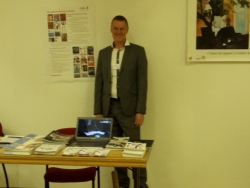GALE failed to address lack of influence on standard setting mechanisms at UNESCO

14 December 2016 - At the world conference of UNESCO affiliated NGOs, GALE tried to discuss the failure of UNESCO to include NGOs in the review of the implementation of conventions. The attempt failed, but may be put on the agenda next year. In the mean time, GALE keeps working on improved participation of NGOs in the UNESCO standard setting mechanisms, especially to make our voices heard in the consultation of the Convention Against Discrimination in Education and the Recommendation on Human Rights Education.
Image: Peter Dankmeijer offering information to the participants of the UNESCO NGO conference, Paris, 13 December.
Standard setting mechanisms
As a consultative partner of UNESCO, GALE has been active for a number of years to make the voices of LGBTI organizations heard in the reviews of international conventions that are relevant for LGBTI students. Conventions are agreements between States on issues they think are important to uphold human rights. Next to Conventions, States can agree on Recommendations. These have a lesser status than Conventions, which are true agreements. Both types of agreements are summarized under the term "standard setting mechanisms", because they represent issues where States agree on standards for the adequate implementation of human rights.
For LGBTI students, six conventions and a number of recommendation are relevant. GALE summarized these in the brochure Advocate for Sexual Diversity Education and the GALE Right to Education Checklist.
The impact of each convention and recommendation is monitored by different UN bodies.
UNESCO's review of discrimination and human rights education
The Convention Against Discrimination in Education and the Recommendation on Human Rights Education, which are very relevant for LGBTI students, are monitored by UNESCO. The implementation of the Convention Against Discrimination in Education (1960) is reviewed every 6 years and 9th consultation will end in 2017. The Recommendation on Human Rights Education (1974) is happening every 4 years and the 6th consultation will also end in 2017.
GALE has had several communications with the relevant departments of UNESCO to lead the way for LGBTI NGOs to submit their experiences in these areas and to assist the dialogue between the NGOs and their State authorities, who are responsible for reviewing their progress. To the surprise of GALE, it gradually became clear that it is virtually impossible for NGOs to have a real influence or voice in the consultations. Despite the political language of UNESCO about the high appreciation of cooperation with NGOs, their participation in the standard setting mechanism processes is minimal. Potentially, UNESCO affiliated NGOs are being informed about consultations that are about to start, but without any guidance about how to get involved. When NGOs try to find out, they are told that they can approach their own State to advise on how the State can report. Some UNESCO officials are even willing to give insight in the questions that States are asked. But there is no way NGOs can get a voice independently of their government. To GALE, this seems counterproductive, especially when discussing the implementation of discrimination in education and human rights education. It may well be that State authorities and NGOs disagree on these themes and where a community voice is imperative to create a good implementation process.
GALE actions
GALE has attempted several times to get access to standard setting procedures. These attempts have failed because UNESCO does not provide opportunities for NGOs to get involved on an international level. This is not just an LGBTI related challenge. This is why GALE tries to ally with other Right to Education organizations to stimulate UNESCO to open up to community voices.
One way to do this was to raise the issue in the annual conference for UNESCO affiliated NGOs, which was held in Paris from 12 to 14 December. GALE suggested the theme to be part of the conference agenda and when this was refused by the UNESCO NGO Liaison Committee (the "board" of the UNESCO affiliated NGOs), it proposed to add it as a point of attention in the Joint Recommendations of the UNESCO affiliated NGOs to the UNESCO Board. However, the Liaison Committee decided not even to table and discuss this proposal.
Peter Dankmeijer, GALE director said: "I was disappointed. I was not even allowed in the final meeting to ask for the reason to not want to discuss our amendment. I got the impression that the Liaison Committee is heavily dominated by French speaking representatives of international organizations with an office in Paris. They seemed to be very happy with the Joint Recommendations they formulated and did not want too much discussion about it. They do not seem to realize this way of operating leads to the exclusion of other voices."
After the conference ended, GALE communicated its frustration with members of the Liaison Committee. It was agreed to meet early next year and to see how this discussion can be put on the agenda of the next conference.


